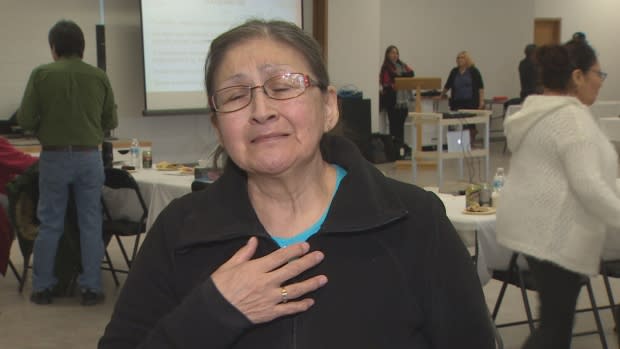Students who died while at residential school to be memorialized
Some little girls from Grollier Hall in Inuvik, N.W.T., were riding on a tractor.
The priest was taking them for drive. The girls were happy because any chance to get out of the school and into the bush was a treat.
The tractor approached some boys who were waving at them from the side of the road.
Everybody was just crying and screaming. - Beatrice Bernhardt, residential school survivor
Then the girls heard screaming.
The tractor jerked to a stop and the priest jumped off.
A young boy had fallen from a snowbank. He fell in front of the tractor and was run over.
"The boys that were up ahead were screaming. We could hear crying," said Beatrice Bernhardt, her eyes welling up with tears. She was one of girls on the tractor that day.
"Everybody was just crying and screaming."

The little boy was Bernhardt's classmate at Grollier Hall, a residence for residential school students in Inuvik.
He was one of two students Bernhardt knew of who died at the school while she was a student there.
When they got back, the children weren't allowed to talk to each other about what happened, Bernhardt said.
They weren't allowed to cry. They weren't allowed to grieve.
"To this day, I don't even know his name," said Bernhardt. "I don't know what they did with him, I don't know if his parents ever knew, found out — nothing."
About 4,200 students never came home
Bernhardt told her story during a break at a National Centre for Truth and Reconciliation event on Thursday in Yellowknife.
The centre is gathering information about children who died or went missing while attending residential school.
Representatives are visiting seven communities across Canada to meet with residential school survivors, their family members, and Indigenous communities to learn more about the lost children, and how they should be memorialized.
Yellowknife is their only Northern stop.
The consultations will inform a memorial register of the estimated 4,200 children who went away to school, and never came home.
The memorial register is the result of the 72nd recommendation of the Truth and Reconciliation commission's report on the legacy of residential schools.
It calls for the federal government to fund a national residential school death register.
The register could include photographs, personal information, community connections, documents in which the children are mentioned, and homework or artwork they created while at school.
Whether the register is public depends on the wishes of the survivors and the childrens' communities.
It's set to launch in March 2019.
'What happened to my child?'
Kaila Johnston, an organizer of the event in Yellowknife, was also a statement gatherer with the Truth and Reconciliation Commission.
"I went across the country listening to survivors stories and one of the themes that did pop up is their brother or sister went missing or their friend at residential school disappeared," she said.
"One of the big questions that we hear from survivors is what happened to my family member? What happened to my friend who was at residential school but we never saw again?"
The centre currently knows of 144 cemeteries in Canada where students are buried, said Johnston. But there could be upwards of 400 burial sites, she said.
Bernhardt was never so grateful to see her parents as she was the summer after the little boy was killed by the tractor.
"Because they knew I had come back another year. I was OK," Bernhardt said.
"Many parents, I'm sure they must wonder what happened to their child when they didn't get off that plane in the summertime, when they come home. What happened to my child?"

